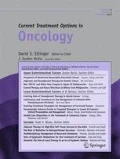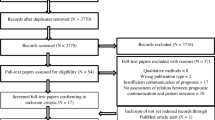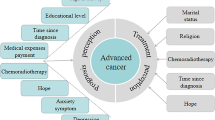Opinion Statement
In the advanced cancer setting, patients, families, and clinicians are often confronted with an uncertain future regarding treatment outcomes and survival. Greater certainty on what to expect can enhance decision-making for many personal and healthcare issues. Although 70–90% of patients with advanced cancer desire open and honest prognostic disclosure, a small proportion do not want to know. Approximately half of patients with advanced cancer have an inaccurate understanding of their illness, which could negatively impact their decision-making. In this review, we use a conceptual framework to highlight 5 key steps along the prognostic continuum, including (1) prognostic formulation, (2) prognostic disclosure, (3) prognostic awareness, (4) prognostic acceptance, and (5) prognosis-based decision-making. We shall summarize the impact of prognostic predictions, disclosure, awareness, and acceptance on various patient and caregiver outcomes, such as hope, trust, anxiety, depression, chemotherapy use, and care planning. Based on where the patient is at along the prognostic continuum, we propose 5 different subgroups (avoidance: “I don’t want to know”; discordant, “I never wanted to know”; anxious, “I don’t know what’s happening”; concerned, “I don’t like this”; acceptance, “I know how to plan ahead”). Although prognostication is not necessarily a linear process, recognizing where the patient is at cognitively and emotionally along the prognostic continuum may allow clinicians to provide personalized interventions, such as specialist palliative care and psychology referral, towards personalizing prognostic disclosure, enhancing prognostic awareness, increasing prognostic acceptance, and supporting decision-making and, ultimately, improving patient outcomes.


Similar content being viewed by others
References and Recommended Reading
Papers of particular interest, published recently, have been highlighted as: • Of importance •• Of major importance
Hui D. Prognostication of survival in patients with advanced Cancer: predicting the unpredictable? Cancer Control. 2015;22:489–97.
Hui D, Bruera E. Internal medicine issues in palliative cancer care. First ed. New York: Oxford University Press; 2014.
LeBlanc TW, Marron JM, Ganai S, et al. Prognostication and communication in oncology. J Oncol Pract. 2019;15:208–15.
Gill TM. The central role of prognosis in clinical decision making. Jama. 2012;307:199–200.
Martin EJ, Widera E. Prognostication in serious illness. Med Clin North Am. 2020;104:391–403.
Sborov K, Giaretta S, Koong A, Aggarwal S, Aslakson R, Gensheimer MF, et al. Impact of accuracy of survival predictions on quality of end-of-life care among patients with metastatic cancer who receive radiation therapy. J Oncol Pract. 2019;15:e262–70.
van der Velden NCA, Meijers MC, Han PKJ, van Laarhoven HWM, Smets EMA, Henselmans I. The effect of prognostic communication on patient outcomes in palliative cancer care: a systematic review. Curr Treat Options in Oncol. 2020;21:40.
Vlckova K, Tuckova A, Polakova K, Loucka M. Factors associated with prognostic awareness in patients with cancer: a systematic review. Psychooncology. 2020;29:990–1003.
Mack JW, Fasciano KM, Block SD. Communication about prognosis with adolescent and young adult patients with cancer: information needs, prognostic awareness, and outcomes of disclosure. J Clin Oncol. 2018;36:1861–7.
Weeks JC, Cook EF, O'Day SJ, Peterson LM, Wenger N, Reding D, et al. Relationship between cancer patients’ predictions of prognosis and their treatment preferences. JAMA. 1998;279:1709–14.
Meropol NJ, Weinfurt KP, Burnett CB, Balshem A, Benson AB III, Castel L, et al. Perceptions of patients and physicians regarding phase I cancer clinical trials: implications for physician-patient communication. J Clin Oncol. 2003;21:2589–96.
Weeks JC, Catalano PJ, Cronin A, Finkelman MD, Mack JW, Keating NL, et al. Patients' expectations about effects of chemotherapy for advanced cancer. N Engl J Med. 2012;367:1616–25.
Yennurajalingam S, Rodrigues LF, Shamieh O, Tricou C, Filbet M, Naing K, et al. Perception of curability among advanced cancer patients: an international collaborative study. Oncologist. 2018;23:501–6.
Cheng JD, Hitt J, Koczwara B, Schulman KA, Burnett CB, Gaskin DJ, et al. Impact of quality of life on patient expectations regarding phase I clinical trials. J Clin Oncol. 2000;18:421–8.
Chen CH, Kuo SC, Tang ST. Current status of accurate prognostic awareness in advanced/terminally ill cancer patients: systematic review and meta-regression analysis. Palliat Med. 2017;31:406–18.
El-Jawahri A, Traeger L, Park ER, et al. Associations among prognostic understanding, quality of life, and mood in patients with advanced cancer. Cancer. 2014;120:278–85.
Enzinger AC, Zhang B, Schrag D, Prigerson HG. Outcomes of prognostic disclosure: associations with prognostic understanding, distress, and relationship with physician among patients with advanced Cancer. J Clin Oncol. 2015;33:3809–16.
Hagerty RG, Butow PN, Ellis PA, Lobb EA, Pendlebury S, Leighl N, et al. Cancer patient preferences for communication of prognosis in the metastatic setting. J Clin Oncol. 2004;22:1721–30.
Yun YH, Lee CG, Kim SY, Lee SW, Heo DS, Kim JS, et al. The attitudes of cancer patients and their families toward the disclosure of terminal illness. J Clin Oncol. 2004;22:307–14.
Epstein AS, Prigerson HG, O'Reilly EM, Maciejewski PK. Discussions of life expectancy and changes in illness understanding in patients with advanced cancer. J Clin Oncol. 2016;34:2398–403.
Mack JW, Cook EF, Wolfe J, Grier HE, Cleary PD, Weeks JC. Understanding of prognosis among parents of children with cancer: parental optimism and the parent-physician interaction. J Clin Oncol. 2007;25:1357–62.
Smith TJ, Dow LA, Virago E, Khatcheressian J, Lyckholm LJ, Matsuyama R. Giving honest information to patients with advanced cancer maintains hope. Oncology (Williston Park). 2010;24:521–5.
van Vliet LM, van der Wall E, Plum NM, Bensing JM. Explicit prognostic information and reassurance about nonabandonment when entering palliative breast cancer care: findings from a scripted video-vignette study. J Clin Oncol. 2013;31:3242–9.
Mori M, Fujimori M, van Vliet LM, et al. Explicit prognostic disclosure to Asian women with breast cancer: a randomized, scripted video-vignette study (J-SUPPORT1601). Cancer. 2019;125:3320–9.
Tanco K, Rhondali W, Perez-Cruz P, Tanzi S, Chisholm GB, Baile W, et al. Patient perception of physician compassion after a more optimistic vs a less optimistic message: a randomized clinical trial. JAMA Oncol. 2015;1:176–83.
Hui D, Nooruddin Z, Didwaniya N, Dev R, de la Cruz M, Kim SH, et al. Concepts and definitions for “actively dying,” “end of life,” “terminally ill,” “terminal care,” and “transition of care”: a systematic review. J Pain Symptom Manag. 2014;47:77–89.
• Nipp RD, Greer JA, El-Jawahri A, et al. Coping and prognostic awareness in patients with advanced cancer. J Clin Oncol. 2017;35:2551–7 This study highlighted the important role of coping mechanisms in fostering prognostic awareness and ultimately acceptance.
• Tang ST, Chang WC, Chen JS, et al. Associations of prognostic awareness/acceptance with psychological distress, existential suffering, and quality of life in terminally ill cancer patients' last year of life. Psychooncology. 2016;25:455–62 This longitudinal study illustrated the dynamic relationship between prognostic awareness, prognostic acceptance and patient reported outcomes.
Thompson GN, Chochinov HM, Wilson KG, McPherson CJ, Chary S, O'Shea FM, et al. Prognostic acceptance and the well-being of patients receiving palliative care for cancer. J Clin Oncol. 2009;27:5757–62.
Thomas JM, O'Leary JR, Fried TR. Understanding their options: determinants of hospice discussion for older persons with advanced illness. J Gen Intern Med. 2009;24:923–8.
Shen MJ, Trevino KM, Prigerson HG. The interactive effect of advanced cancer patient and caregiver prognostic understanding on patients’ completion of do not resuscitate orders. Psychooncology. 2018;27:1765–71.
Ray A, Block SD, Friedlander RJ, Zhang B, Maciejewski PK, Prigerson HG. Peaceful awareness in patients with advanced cancer. J Palliat Med. 2006;9:1359–68.
Rich BA. Prognostication in clinical medicine: prophecy or professional responsibility? J Leg Med. 2002;23:297–358.
Christakis NA. Prognostication and bioethics. Daedalus. 1999;128:197–214.
Corrigan PW. The risk of prognostication. Psychiatr Serv. 2013;64:719.
Hui D, Park M, Liu D, Paiva CE, Suh SY, Morita T, et al. Clinician prediction of survival versus the palliative prognostic score: which approach is more accurate? Eur J Cancer. 2016;64:89–95.
Farinholt P, Park M, Guo Y, Bruera E, Hui D. A comparison of the accuracy of clinician prediction of survival versus the palliative prognostic index. J Pain Symptom Manag. 2018;55:792–7.
Basile M, Press A, Adia AC, et al. Does calculated prognostic estimation Lead to different outcomes compared with experience-based prognostication in the ICU? A Systematic Review. Crit Care Explor. 2019;1:e0004.
Hui D, Paiva CE, Del Fabbro EG, et al. Prognostication in advanced cancer: update and directions for future research. Support Care Cancer. 2019;27:1973–84.
Hui D, Maxwell JP, Paiva CE. Dealing with prognostic uncertainty: the role of prognostic models and websites for patients with advanced cancer. Curr Opin Support Palliat Care. 2019;13:360–8.
Clayton JM, Hancock K, Parker S, Butow PN, Walder S, Carrick S, et al. Sustaining hope when communicating with terminally ill patients and their families: a systematic review. Psycho-oncology. 2008;17:641–59.
Parker SM, Clayton JM, Hancock K, Walder S, Butow PN, Carrick S, et al. A systematic review of prognostic/end-of-life communication with adults in the advanced stages of a life-limiting illness: patient/caregiver preferences for the content, style, and timing of information. J Pain Symptom Manag. 2007;34:81–93.
Back AL. Patient-clinician communication issues in palliative Care for Patients with Advanced Cancer. J Clin Oncol. 2020;38:866–76.
Gramling R, Stanek S, Han PKJ, Duberstein P, Quill TE, Temel JS, et al. Distress due to prognostic uncertainty in palliative care: frequency, distribution, and outcomes among hospitalized patients with advanced Cancer. J Palliat Med. 2018;21:315–21.
Innes S, Payne S. Advanced cancer patients' prognostic information preferences: a review. Palliat Med. 2009;23:29–39.
Hoesseini A, Dronkers EAC, Sewnaik A, Hardillo JAU, Baatenburg de Jong RJ, Offerman MPJ. Head and neck cancer patients' preferences for individualized prognostic information: a focus group study. BMC Cancer. 2020;20:399.
Jackson VA, Jacobsen J, Greer JA, Pirl WF, Temel JS, Back AL. The cultivation of prognostic awareness through the provision of early palliative care in the ambulatory setting: a communication guide. J Palliat Med. 2013;16:894–900.
Jacobsen J, Brenner K, Greer JA, Jacobo M, Rosenberg L, Nipp RD, et al. When a patient is reluctant to talk about it: a dual framework to focus on living well and tolerate the possibility of dying. J Palliat Med. 2018;21:322–7.
Back AL, Arnold RM. Discussing prognosis: "how much do you want to know?" talking to patients who do not want information or who are ambivalent. J Clin Oncol. 2006;24:4214–7.
Butow PN, Clayton JM, Epstein RM. Prognostic awareness in adult oncology and palliative care. J Clin Oncol. 2020;38:877–84.
Baile WF, Buckman R, Lenzi R, Glober G, Beale EA, Kudelka AP. SPIKES-A six-step protocol for delivering bad news: application to the patient with cancer. Oncologist. 2000;5:302–11.
Clayton JM, Hancock KM, Butow PN, Tattersall MH, Currow DC, Australian and new Zealand Expert Advisory Group, et al. Clinical practice guidelines for communicating prognosis and end-of-life issues with adults in the advanced stages of a life-limiting illness, and their caregivers. Med J Aust. 2007;186:S77–s105.
Bernacki R, Paladino J, Neville BA, Hutchings M, Kavanagh J, Geerse OP, et al. Effect of the serious illness care program in outpatient oncology: a cluster randomized clinical trial. JAMA Intern Med. 2019;179:751–9.
Back AL, Arnold RM, Baile WF, Fryer-Edwards KA, Alexander SC, Barley GE, et al. Efficacy of communication skills training for giving bad news and discussing transitions to palliative care. Arch Intern Med. 2007;167:453–60.
Paladino J, Bernacki R, Neville BA, Kavanagh J, Miranda SP, Palmor M, et al. Evaluating an intervention to improve communication between oncology clinicians and patients with life-limiting Cancer: a cluster randomized clinical trial of the serious illness care program. JAMA Oncol. 2019;5:801–9.
•• Temel JS, Greer JA, Admane S, et al. Longitudinal perceptions of prognosis and goals of therapy in patients with metastatic non-small-cell lung cancer: results of a randomized study of early palliative care. J Clin Oncol. 2011;29:2319–26 This secondary analysis of a landmark randomized trial highlighted the interaction between palliative care, prognostic awareness and clinical outcomes.
Funding
David Hui received grants from Insys and Teva. David Hui is also supported in part by grants from the National Cancer Institute (1R01CA214960-01A1; 1R01CA225701-01A1), the National Institute of Nursing Research (1R21NR016736–01), and the American Cancer Society (MRSG-14-1418-01-CCE).
Author information
Authors and Affiliations
Corresponding author
Ethics declarations
Conflict of Interest
Based on the disclosure forms received, none of the authors has any potential conflicts of interest to disclose.
Human and Animal Rights and Informed Consent
This article does not contain any studies with human or animal subjects performed by any of the authors.
Additional information
Publisher’s note
Springer Nature remains neutral with regard to jurisdictional claims in published maps and institutional affiliations.
This article is part of the Topical Collection on Palliative and Supportive Care
Rights and permissions
About this article
Cite this article
Hui, D., Mo, L. & Paiva, C.E. The Importance of Prognostication: Impact of Prognostic Predictions, Disclosures, Awareness, and Acceptance on Patient Outcomes. Curr. Treat. Options in Oncol. 22, 12 (2021). https://doi.org/10.1007/s11864-020-00810-3
Accepted:
Published:
DOI: https://doi.org/10.1007/s11864-020-00810-3




